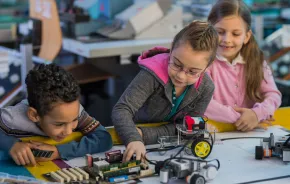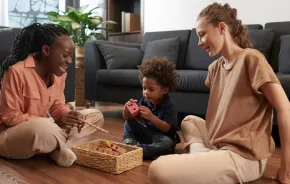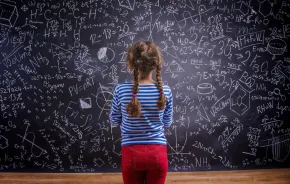
Sarah* says she always knew her older daughter was unusual. She talked early, used vocabulary much more sophisticated than that of her peers and read as a preschooler.
The Seattle-area mom of two and her husband also noticed that something seemed off about the way their daughter interacted with other children. A school district evaluation found motor delays and sensory and social issues, and Sarah’s daughter qualified for special education services. But it wasn’t until she was 9 that the family received a complete diagnosis after more thorough testing.
Sarah’s daughter is on the autism spectrum and has a visual processing disorder called NVLD, as well as a specific learning disability in math. She is also profoundly gifted, scoring in the 99th percentile on the verbal portion of the IQ test. This unique profile is what’s commonly referred to as “twice exceptional” or “2e.”
If you’re the parent or teacher of someone who is 2e or if you’re 2e yourself, you’ve likely encountered plenty of myths about what it means to be twice exceptional. Read on for facts and expert advice.
Myth no. 1: A gifted child can’t have learning issues
The term 2e refers to a child who is exceptional in at least two ways. Most commonly, the term refers to a child who is intellectually gifted and also has a learning disability, attention issue or special need. Despite abundant research on 2e children in schools, there is still a lack of awareness that these children exist.
Why? Often these children are overlooked because of their unusual combinations of strengths and weaknesses. For example, a child may be verbally gifted but have a learning disability like dysgraphia, which affects their ability to take notes and get ideas on paper. Their English teacher may just see a bright child who needs to try harder or who simply doesn’t complete their work.
To complicate matters, many educators have received little or no information about this unique group of children.
“My husband and I have both worked in the public school system for more than 20 years apiece and knew nothing about 2e until we experienced it as parents,” says Staci S.*, whose son is 2e. “Maybe that’s the biggest myth I see: That it isn’t a real thing or something to be addressed.”
Myth no. 2: Your child just needs to try harder
Another common — and often damaging — misconception about people who are twice exceptional is that their strengths allow them to cope with their disabilities without extra support.
Sometimes, well-meaning adults will tell the parents of a child who is 2e that their child is just being lazy or needs to try harder. These kids often have such good coping skills that people don’t see their struggles.
As Sarah says about her daughter, “She is smart enough that teachers don’t see her struggles with her disability, and disabled enough that people don’t always see how smart she is.”
Myth no. 3: 2e children don’t belong in advanced classes
Schools often seem flummoxed about where to place 2e children. These kids neither match the profile of a typical student in a special education classroom nor that of a more typical student in an honors or gifted class. Several parents I spoke with have been told that kids who are in advanced classes shouldn’t need extra support.
Sarah recalls her experience with Seattle Public Schools this way: “I had to fight for her to be included in the public school gifted program and then had to fight for her to get support once she was in it.”
Myth no. 4: 2e children can’t qualify for help from the school system
It’s not uncommon for parents of 2e kids to hear that their children aren’t behind enough to qualify for special support at school; however, federal law requires schools to try to identify students with disabilities.
Some 2e kids qualify for individualized education plans (IEPs), while others don’t receive specially designed instruction, but do receive accommodations from a 504 plan. For example, a child with dysgraphia may need an electronic notetaker, or a child with a processing-speed issue may need extended time to take tests.
If you have difficulty getting help for your child, you may want to enlist the help of an advocate, a person specially trained in laws that apply to the education of children with special needs. Two online directories to check are those at Twice Exceptional Children’s Advocacy and the Council of Parent Attorneys and Advocates.
Also, local groups can often suggest eresources; try Washington nonprofit Exceptional Families Network or this 2e Seattle parent group, which meets monthly and has a Facebook group with more than 600 members.
Whatever your child’s unique set of special gifts, it’s crucial that they get the time and support to pursue those strengths. In some cases, that means letting go of what you thought you knew about your child.
“We had to learn how to appreciate her for who she is and not try to force her into the mold of more typical kids,” says Sarah of her daughter. “She flies high when we let her special interests guide her education and her social life. We were all happier once we quit forcing so many therapies on her and just let her be.”
Resources for 2e Kids and Their FamiliesSupport groups. Search for Facebook groups for parents of 2e children as well as for teens and adults who are twice exceptional. Books. A couple of titles to get you started are “Different Minds: Gifted Children with AD/HD, Asperger Syndrome and Other Learning Deficits” by Deirdre V. Lovecky, and “Twice-Exceptional Gifted Children: Understanding, Teaching, and Counseling Gifted Students” by Beverly Trail. Online resources. The National Association for Gifted Children has a helpful section on support for Film. Watch the film “2e: Twice Exceptional” to learn of other family stories and resources. |











